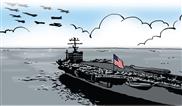Practical code better than role models
It has been almost 50 years since Chairman Mao Zedong called for learning from Lei Feng on March 5, 1963. However nowadays, we rarely hear about public altruism. Instead, what we often hear about is officials' corrupt behaviors and the nation's moral crisis.
The current situation is different from that in the 1960s.
At that time, China was undergoing great political and natural difficulties. People needed a spiritual impetus to establish an altruistic and dedicated atmosphere so as to overcome these difficulties. The greatest personal value was to serve others.
That's why Lei Feng became an icon of that era.
As China battles its way through drastic social changes, the values people used to endorse have changed. Despite various activities designed to remember the selfless soldier, his spirit is distant from people living in today's materialistic society.
Since today's young people are taught to be independent and have their own thoughts, the collectivism and altruism for which Lei Feng is highly praised may not fit in today's competitive society.
Modern icons are dealmakers and entrepreneurs like late Apple CEO Steve Jobs. People judge others' success by looking at how much money they have made and how different they are from the crowd.
The pursuit for personal values makes people too hasty to learn from Lei Feng. The spirit of Lei Feng may only be empty words.
We still embrace anything good. That's a moral requirement. But the value of doing good deeds should be accepted by the whole society rather than become alien.
An altruistic icon may not be needed anymore. What we need more are basic rules of etiquette. Social morals would be improved faster if we demanded people stop spitting in the street rather than simply calling for learning from Lei Feng.
The author is a reporter with the Global Times. wangwenwen@globaltimes.com.cn
Lei a human being as well as an idol
Lei Feng has been regarded as a role model for decades. His influence is like Mother Teresa in the West. His pure selfless, altruistic attitude, patriotism and modesty sometimes make people feel distant. But in some ways Lei wasn't that unusual a young man.
We can find many things shared in common by both Lei and today's young people. Lei turns out to have had a surprising yen for fashion.
A few days ago, I went to the Lei Feng Memorial Hall in Fushun, Liaoning Province for the first time. Fushun is where Lei served in the army until he died in a vehicle accident. The photos and materials from Lei's life displayed there could hardly interest me, as I have been quite familiar with Lei's good deeds since my childhood.
But one photo of Lei Feng in an old leather jacket impressed me. Lei looked quite handsome in that photo.
A guide told me that the jacket was Lei's favorite. The jacket, together with a pair of trousers, a Swiss watch and a leather suitcase, are called “Lei's Four Pieces.” These were all popular luxuries in 1962.
I had never seen Lei Feng in such fashionable outfits, as he is usually shown in a green army uniform. To my surprise, he was no different from us in chasing trends and was just an ordinary young person.
We were taught to learn from Lei Feng since our primary school education. I firmly believe that the spirit of Lei Feng is never out of date and should be promoted at any time of history. But his noble behavior puts him within our sight but beyond our reach. His spirit is just too far to be followed.
What we need nowadays is not only a model Lei Feng, but also a real Lei Feng. If the spirit of Lei Feng is to live on and keep its vitality, a benign and uncontentious image is not enough.
As we feel closer to him, we will know that the spirit of Lei Feng is not so far away from us.
The author is an editor with China Youth magazine based in Beijing. yinjunguo@126.com
Asia ignores 'divide and conquer' tactics
In 1945, then US President Harry S. Truman, guided by his Europhile Secretary of State Dean Acheson, reversed former President Franklin D. Roosevelt’s correct policy of aligning the US in Asia with Asians, rather than with their European colonizers.
Common security can calm turbulent sea
In an era of increased resource competition, the oil, natural gas and other minerals under the South China Sea's seabed, as well as control of their sea lanes, have become spectacular prizes sought by nations with competing territorial claims to them. With the US, China, Vietnam, the Philippines, Japan and India all taking aggressive actions (military and/or economic and diplomatic), the dangers of miscalculation leading to disastrous armed conflict have arisen.
Stalemate lingers in South China Sea
Global Times articles on Sino-Vietnamese conflict over the South China Sea were by far its most commented online during 2011. Other most commented articles this year also relate to China’s strategy in dealing with surrounding countries, with US return to Asia as a macro-background. What are China’s best options to handle the dispute, which looks set to continue for years to come? Why is the issue so heated? Global Times asked three experts to give their opinions on this issue.
Flaws in new systems no reason to go backwards
It's the busiest time of a year again for the country's transport system. The Chinese New Year is just over two weeks away.
Railway ministry fails to grasp scope of chunyun chaos
The really tough challenge for the Ministry of Railways (MOR) at the moment is not dealing with last year’s train crash in Wenzhou. Liu Zhijun, the former head of the MOR who faces corruption charges, has to take responsibility for the tragedy, and the related people are punished, then the whole thing can be regarded as history.
Protection of other dialects
Protection of other dialects
Cantonese remains global tongue despite Putonghua's spread
The goals of the authorities to promote Putonghua by issuing the new policy are fundamentally good. The popularity of Putonghua is due to its convenience for communication, which clears up the obstacles between people from different areas. Promoting Putonghua in televisions and radio programs is aimed at helping local citizens improve their communication skills and better understand the culture behind the language. For immigrants who just left hometowns, the Putonghua programs makeit easy for them to get information and reduce the feeling of isolation.
New rules undermine vibrant linguistic and cultural diversity
It is not the first time that the use of Putonghua has been mandated in Guangdong Province. It is natural for natives of Guangdong to resist the new policy. They use their mother tongue every day, and it gives them a sense of belonging and identity.
Taiwanese public empowered through democratic process
The last televised debate among the three candidates for the upcoming Taiwanese leadership elections was held on Saturday in Taipei. Since shedding one-party rule, Taiwan has achieved commendable democratic progress. It experienced political struggle during the long process of democratization between 1986 and 1995.
Mainland needs to explore its own way for democratization
The candidates for the Taiwanese elections officially started their campaigns with a televised debate early this month. The debate Saturday is the last of the three televised debates. It is the first time Taiwan has introduced televised debate into the leadership election, which is seen as a significant step for Taiwanese democracy.
Netizens' fears of new 'real-name' system misplaced
New rules that demand users of Weibo register under their real names before being allowed to post have sparked lots of controversy.
Once the announcement was issued, the share price of Sina, China’s largest Weibo service, fell by 11 percent early Friday but rebounded later. It is unclear how the rules will affect the development of Weibo operators.
Anonymity essential for speaking truth to power
The Beijing municipal government announced Friday that, within the next three months, Chinese Weibo (microblogging) services would require real-name identification.
CPI figures don't match realities of today's prices
People often remark that the price of goods is soaring like an eagle, but the official CPI data, which measures inflation, is creeping like a tortoise. These discrepancies are nothing new - when housing prices were skyrocketing, official statistics claimed that housing prices had only increased 1.5 percent from the previous year.
Three decades of change affects more than vegetables
I am somewhat surprised by Chen Mingyuan's conclusions. By basing the whole argument on some unproved assumptions and direct observation of annual CPI variations, his analysis lacks careful considerations.
China's global business needs backup of military power
I read on a microblog the other day that it is dangerous to be an extremist country. The author argues that people will shun it as they will shun an extreme person, and that China needs friends. He accuses people who want to use China's military might to guard its business of being stuck in an imperialist 19th century mentality that China suffered from when invaded by Britain during the opium wars.
Aggressive diplomacy will leave country in isolation
Over the recent years, China's diplomatic approach has been criticized by some as being too soft. Some scholars also urged the government to be aggressive in foreign affairs. But I believe China doesn't have to be aggressive. Sticking to its own belief and remaining calm are good enough.


